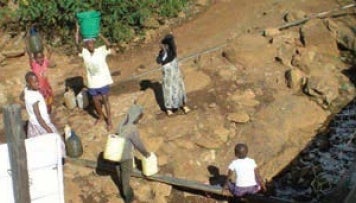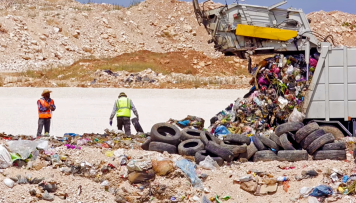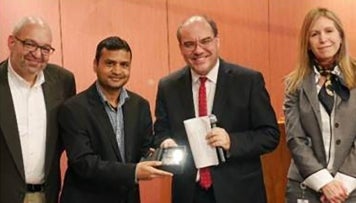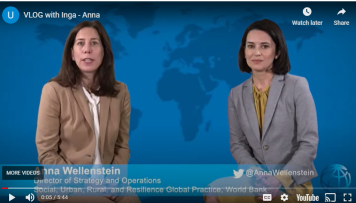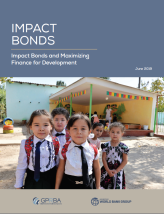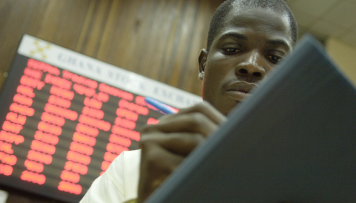
“During the past two centuries, innovation has more than doubled our life span and given us cheap energy and more food. If we project what the world will be like 10 years from now without continuing innovation in health, energy or food, the picture is dark,” Bill Gates
Did you know that currently more than half of the world’s population lives in urban areas and this will rise to 70 percent by 2050? How can developing country governments respond to the demands of this rapid urbanization to deliver essential infrastructure and related services, especially for the urban poor? The estimated annual global infrastructure investment needed is US$3.7 trillion – of which only about US$2.7 trillion is currently met on an annual basis. New and innovative solutions are needed to finance the delivery of basic services to these residents.
Innovation is all about finding and applying new ways to address existing problems and accelerate development impact. GPOBA uses Output-Based Aid (OBA) and Results-Based Financing (RBF) as one form of innovative financing to bridge the gap between poor households, government aims and service providers. OBA projects carefully target poor and marginalized households, working with a range of service providers and governments to enable these consumers to access basic services. OBA funds are disbursed only when services have been delivered and verified, ensuring that service providers are held accountable and that money is spent where it’s needed on things that actually happen.
Since the establishment of GPOBA in 2003, 48 subsidy projects totaling US$239 million have supported access to basic services for over 9 million beneficiaries. GPOBA has worked in seven sectors including energy, water, health, sanitation, solid waste management, education, and telecoms in 28 countries spread across Sub-Sharan Africa, South Asia, Middle East and North Africa, Latin America and the Caribbean as well as Europe and Central Asia regions. Through these projects, OBA has demonstrated efficiency gains through competition in most sectors when competitive pressures have been applied in the selection of the OBA service provider.
GPOBA’s depth of experience, reach and results focus in project design, targeting poor consumers and applying these innovative financing mechanisms is the foundation of its expanding work as a Center of Expertise on output and results-based approaches. Knowledge exchanges, learning activities and publications provide lessons from projects in many regions and sectors. While OBA has been used primarily for increasing access to basic services, recent experience highlighted in this knowledge note on Kenya describes how sector reforms and innovative financing initiatives can also improve access to commercial finance in the water and sanitation sector.
GPOBA is also examining the potential for OBA and other forms of RBF in untested and pioneering sectors. Most recent studies include urban transport, climate and affordable housing. GPOBA is also looking to expand its portfolio to other forms of innovative RBF schemes such as Social Impact Bonds (SIBs), which are a results-based financing mechanism that harness private capital to deliver social services for long term results. SIBs allow for financial returns to be tied to the social impact of services provided and by this interest the private sector in programs that are not wholly profit-centered but produce social externalities.
GPOBA also recognizes innovation through its annual Inn-OBA-tions Awards. The Award, launched in 2013 as part of GPOBA’s 10th year Anniversary, recognized ten award-winning pilot projects which exemplified the RBF/OBA scheme by showcasing projects with potential for replication and scaling up. Since then a total of 18 projects have been recognized, including the 2016 Inn-OBA-tion award winner, the Nepal Micro-Hydro project. This project is helping Nepal to mitigate climate change and generating results-based financial revenues that are being reinvested to scale up micro-hydro plants and to maintain and rehabilitate existing ones to ensure sustainable operations. Previous awards from 2014 recognized RBF projects from the health, Energy and Water sectors in Bolivia, Kenya and Zimbabwe. In 2015 projects from West Bank Solid Waste Management (SWM); Uganda Grid Based OBA Facility: Energy for Rural Transformation II; and Moldova Biomass Heating and Energy Conservation Project ; and Indonesia Local Government and Decentralization were recognized.
Related Resources
Results-Based Financing (RBF)
GPOBA Publications
Lessons Learned
Knowledge Note: Kenya
Social Impact Bonds
Inn-OBA-tion Award winners 2013
Inn-OBA-tion Award Winners 2014
Inn-OBA-tion Award Winners 2015
